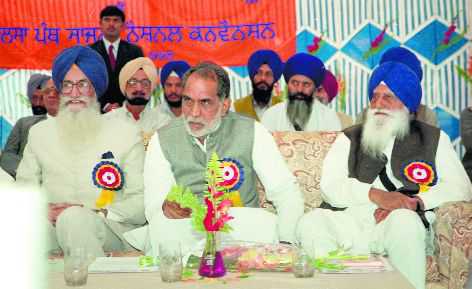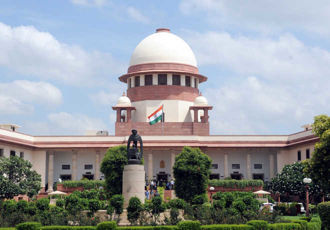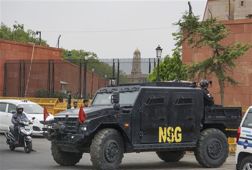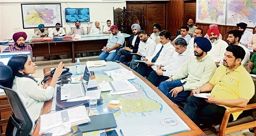
Rustic roots: Chandra Shekhar (flanked in this file photo by former Punjab CM Surjit Singh Barnala and SGPC chief Gurcharan Singh Tohra) consistently remained a left-of-the-centre politician. He had equal contempt for capitalism and Indian communists.
Bhupinder Brar
In the very opening lines of the preface, the authors of this book rue the fact that in most popular writings on the political history of independent India, their subject, Chandra Shekhar, “would hardly find a mention, not even a footnote.” This, despite the fact that the man had led an eventful life, persistently marking his presence on the centre-stage of Indian politics. At one time, he was the general secretary of Praja Socialist Party, at another a rebel ‘Young Turk’ of Congress, and at yet another time the President of Janata Party. He broke away finally to form Janata Dal (Socialist) and managed to become the eighth prime minister of the country with the support of the same Congress that he had rebelled against, only to lose this support and his prime-ministership in a matter of seven months.
The story of such a man should indeed make fascinating reading. The authors of this book seek to tell that story. Their intention is set the unappreciative record straight and ensure that Chandra Shekhar occupies a place in political history they believe he deserved. Unfortunately, however, they fail in their mission for reasons mostly of overzealousness.
It is one thing to be an admirer, quite another to be an uncritical devotee. The former could write a good biography, the latter would inevitably come up with hagiography. Consider, for example, the very subtitle of the book: The Last Icon of Ideological Politics. One would wonder why an ideologically committed person, let alone an ideological ‘icon’, would change half a dozen political parties in his political career.
At any rate, to call him the ‘last icon’ would surely be unfair to those who came after him and would like a share in the pie of being icons. After all, he was not all that active from the time he had lost prime-ministership in 1991 to the time he died in 2007. Even his picture on the cover of the book, airbrushed and luminescent, is so untrue of the rugged and rustic look that Chandra Shekhar carried as a badge of honour.
What should be acknowledged in all fairness to Chandra Shekhar is the fact that he remained consistently a left-of-the-centre politician. He was a part of the peculiar breed of ‘Indian socialists’ who had equal contempt for capitalism and Indian communists. This breed of socialism was internally inconsistent, and ambivalent and contradictory on several important political-ideological questions. So was Chandra Shekhar.
This comes out most clearly in the later sections of the book, which deal with his position on questions of liberalisation, privatisation and globalisation. He could decide to truck with the Swadeshi Jagran Manch because it opposed globalisation but was an affiliate of the right-wing nationalist RSS. He was for liberalisation but only for what he considered was good liberalisation. He was against imperialism, and the IMF and the World Bank, but he wanted to come good on repayment of loans and could mortgage Indian gold reserves to the central banks of the same imperialists.
The epitome of all this is the following irony. Just a short while before this book was published, finance minister in Chandra Shekhar’s cabinet, Yashwant Sinha had published his autobiography. While this book wishes to paint Chandra Shekhar as a committed socialist, Sinha claims to be the real author of the budget that Manmohan Singh had the fortune to present later under Narsimha Rao. The credit for ushering in liberal reforms, therefore claims Sinha, should go to the Shekhar-Sinha team rather than the Rao-Singh team!
The truth is that Chandra Shekhar became a prime minister at a very difficult time. India was in a deep financial mess that was not of his making. India was also in a political mess when the only alternative to the Congress party was rag-tag coalitions and inchoate party mergers. The truth, however, also was that Chandra Shekhar chose to split his party in order to dislodge VP Singh and himself become the prime minister. He willingly became a puppet in the hands of the opportunistic Congress when he had no solid support of his own. In the end, therefore, the ignominy was only his.
There’s nothing critical about Shekhar in this book. It is a eulogy. But this should not come as a surprise because one of the authors is the current Deputy Chairman of Rajya Sabha; the book has a preface by former President of India Pranab Mukherjee; and it was released by Prime Minister Narendra Modi.


























